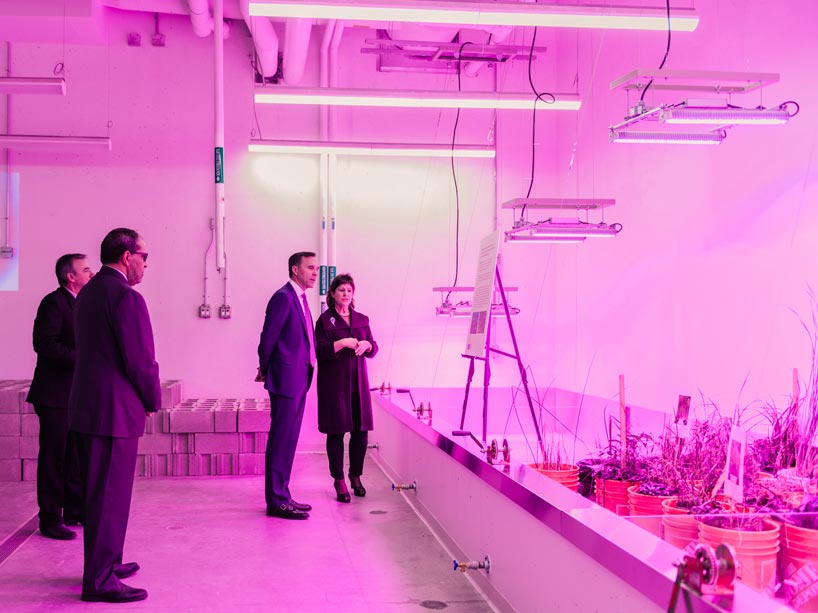Ryerson Urban Water makes a splash

Researcher Lynda McCarthy shows the new lab space at Ryerson Urban Water to Bill Morneau, federal finance minister, at the opening of the Centre for Urban Innovation. Pictured left: President Mohamed Lachemi and Nicholas Reid, RUW director. Photo: Alyssa K. Faoro.
From drinking to showering to washing the dishes to flushing the toilet, we use water every day but rarely stop to think about where that water comes from, or whether we’re using it in a sustainable way.
That’s where Ryerson Urban Water (RUW), with new labs at the Centre for Urban Innovation (CUI) on the north edge of Ryerson’s campus, comes in. RUW’s researchers take a keen interest in every aspect of the urban water cycle, investigating everything from the quality of the water we drink, to the technologies used for treating sewage, to storm water management. “Our over-arching goal is to try to achieve a healthy, sustainable urban water cycle,” says Nicholas Reid, executive director of RUW.
Down in the CUI’s basement, RUW’s AQUAbox Experimental Lab is a centre for innovative experimentation and research, with a particular focus on creating conditions that mimic those of a real city and its surroundings, especially its wetlands.
Roughly the size of two tennis courts, the lab houses an enormous metal tank – a wetland simulator – that can be filled with soil, plants, and of course water. And because the tank can be divided into sections, researchers can vary one parameter (salinity for example) while keeping everything else constant, and observe the results.
“Wetlands play a vital role in cleaning our water as it makes its way through the environment, back to the rivers and lakes, and in removing carbon dioxide from the atmosphere,” Reid says. “So it’s vital that we figure out how we can best nurture wetlands, and understand their function.”
One thing that unavoidably makes its way into the water is chloride, from road salt. The chloride accumulates in storm water management ponds, and can move through the environment. RUW’s Claire Oswald, a professor in the Department of Geography and Environmental Studies, has been studying this process along with master of science student Wai Lam. Research has shown that salt can make its way into the ground water, and then, long after it was applied, make its way back into streams, rivers and lakes – so tracking where and how chloride moves through the environment is vitally important.
In the quest for a healthier water system, ordinary people can help. “Citizen science” projects, such as those in which people participate in aquatic monitoring programs, can yield valuable data. Edward Millar, a PhD student of Stephanie Melles, a professor in the Department of Chemistry and Biology, and co-supervised by geography professor Claus Rinner, is studying how technology affects the interactions that experts and laypersons have.
As for the average city-dweller, Reid’s number-one piece of advice is to think just a little more carefully about what we put down the drain. He rattles off a list of things that people flush, but shouldn’t – paper towels, baby wipes, dental floss, condoms – all of which damage sanitary system infrastructure and harm ecosystems. It’s something that his colleague, Darko Joksimovic, a professor in water resources, has been studying, along with master of science student Barry Orr.
Orr has set up a “flushability test lab” in RUW’s AQUAbox, to study the impact of disposable wipes that get flushed. Municipalities are spending millions of dollars to deal with the impact of clogging caused by baby wipes, Reid explains. “All we have to do is put that garbage in the container next to the toilet, and we’d be saving all of that money.”
Dan Falk (@danfalk) (Journalism ’92) is a science journalist based in Toronto. His books include The Science of Shakespeare and In Search of Time.